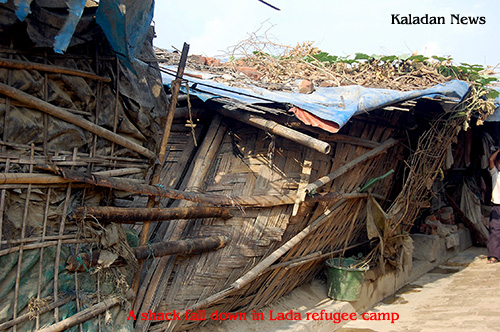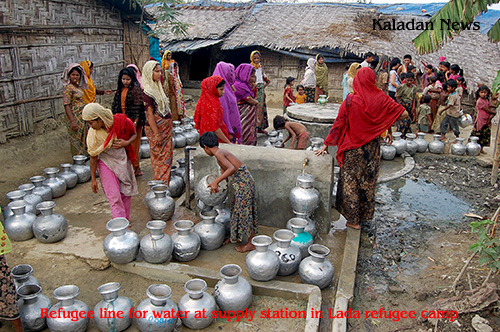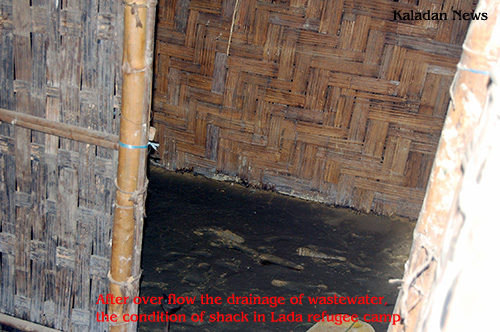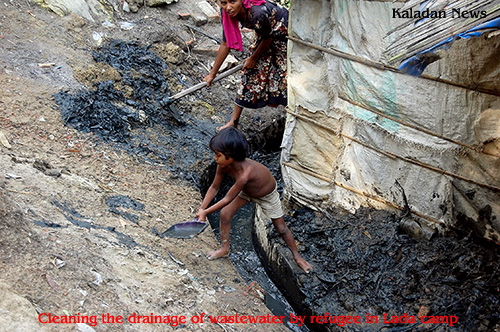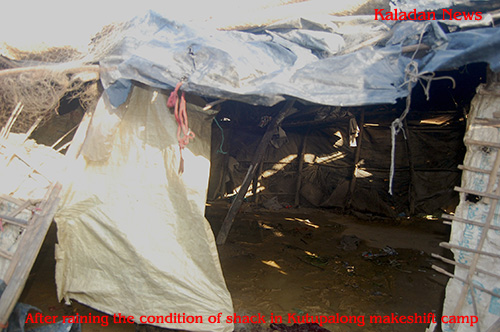No place to live for Rohingya
 Teknaf, Bangladesh: The Arakanese Rohingya who are living in the Lada Refugee Camp are facing risks to their lives due to the condition of their shacks, according to a refugee leader from the camp.A shack fall down in Lada refugee camp
Teknaf, Bangladesh: The Arakanese Rohingya who are living in the Lada Refugee Camp are facing risks to their lives due to the condition of their shacks, according to a refugee leader from the camp.A shack fall down in Lada refugee camp“The rainy season is coming soon, but we have no facilities to roof properly for rain. Every shack is getting rain water inside when the rain falls.”
Beside this, refugees are facing water problems in the camp, and are getting water supplies two times per day, said Samira Katoon from the camp.
“There are more than 12,000 refugees in the camp, but the management only provides eight water stations. We get only two pots per day.”
“All the refugees line up for water to get water with pots. Plastic pots are not allowed. We need aluminum pots which are costly for refugees to buy.”
Similarly, the sanitation conditions in the camp are now worse. The refugees are not able to sleep in the shacks at night because of the overflow of wastewater drainage, said another camp leader.
“The drainages are blocked by locals, which was passed through their land. The locals urged the management group to settle as per their previous agreement.”
“The locals need their jobs which they get before, but now they were fired by the management, and the locals blocked the drainages out of retaliation. But, the refugees are facing overflows of wastewater in their shacks and aren’t able to stay in the shacks.”
The refugees in the camp are not getting any support from any quarters. The refugees work for their survival with different jobs and different places. Some refugee women are facing sexual harassment by locals while collecting firewood from the forest, which is far from the camp, for their survival and to support their family.
The Lada Refugee Camp is managed by Muslim Aid UK, including healthcare programs and Solidarity is working for the sanitation program in the camp.
In the Kutupalonglow unregistered refugee camp, where more than 40,000 refugees live, is also facing unsafe shacks which may fall down if rain and winds come, and food security is a concern as no one is helping these refugees, according to a camp leader from Kutupalong makeshift camp.
The female refugees are also facing the same problem as women from Lada Camp while they go to collect firewood from the forest.
“We build our shacks with bushes and plastic for less costs and some refugees are building their shacks with mud walls for security. The big problem is if the rain falls, the mud walls fall down with water, and if winds blow up, the plastic will blow with the winds.”
In northern Arakan, the Arakanese Rohingya are also facing problems in earning their livelihood due to various restrictions which have been imposed by the concerned authorities, according to a local politician from Maungdaw.
“Recently, the Burmese border security forces, or Nasaka, fabricated an allegation of linking villagers with the Taliban and arrested some villagers last month. Most villagers are not able to stay in their home. Most of the religious leaders are changing their dress for fear of arrest. The arrested 20 villagers are branded with connections to illegal organizations, which the authority filed as cases with acts 17/1 and 17/2. The case will be heard in the Maungdaw court soon.”






































